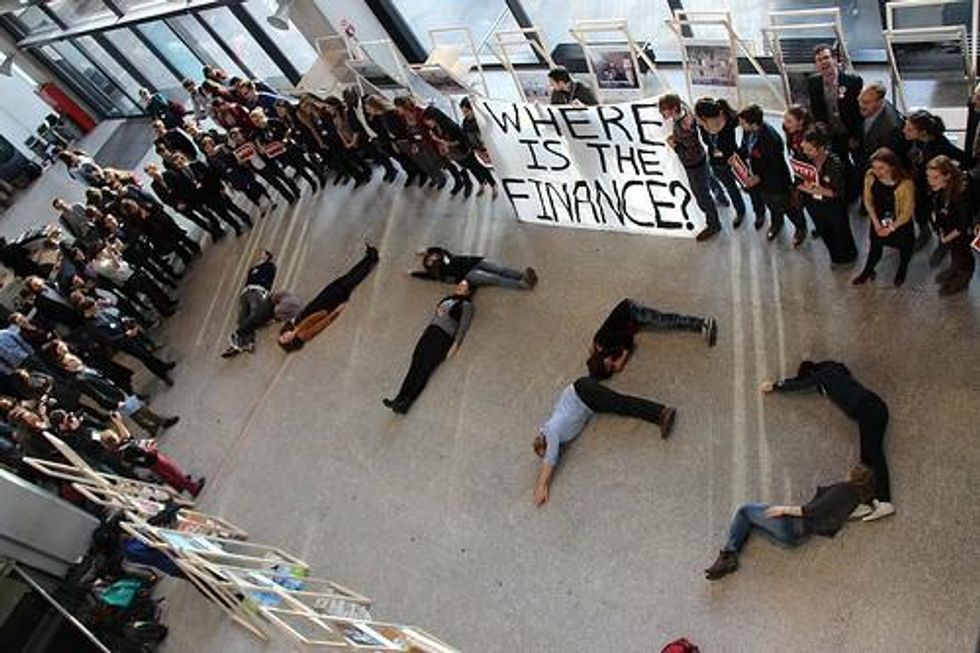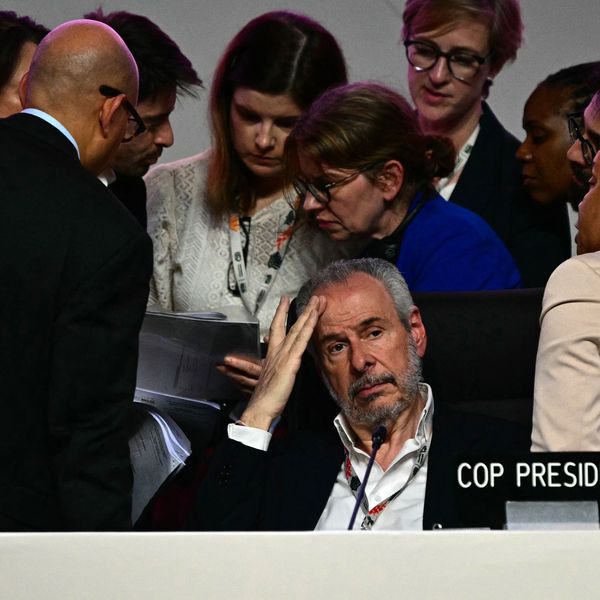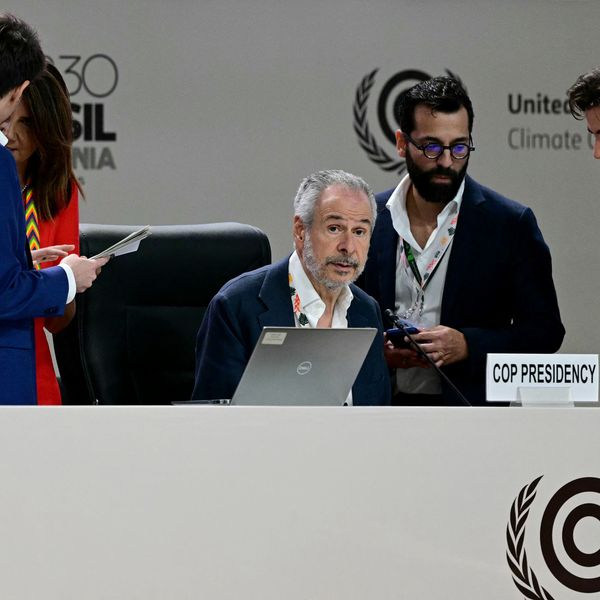Climate Finance at COP 19: A Post-Mortem
Why the issue of climate finance stalled at this year’s UN climate change conference
Activists lay down in the halls of the United Nations Climate Change Conference in Warsaw, Poland last week, forming the letters "W.T.F." with their bodies. The letters stood for "Where's The Finance?," and their message was clear--the failure to revamp the funding to help developing countries green their economies and prepare for climate change impacts had turned the conference into a deep disappointment.

Most nations agree that developing countries need pledges of financial assistance from wealthier nations to contribute to domestic efforts to reduce their emissions and to adapt to the effects of climate change. The World Bank estimates that developing countries' needs will increase to hundreds of billions of dollars a year by 2020. However, developed and developing countries have vastly different ideas of the form this support should take. Because of these tensions, COP19 has failed to produce a meaningful pathway towards equitable climate finance. Should we be surprised? An autopsy of climate finance and the political tensions surrounding it reveals that the possibility of a powerful and just climate finance deal for 2013 was truly dead on arrival.
In Copenhagen in 2009, developed countries collectively pledged US$30 billion per year to support mitigation and adaptation efforts in developing countries. Parties pledged to scale-up the yearly sum to US$100 billion after this 'fast start' finance period ended in 2012. Although countries indicated that they have successfully delivered the agreed-upon sum during the fast-start period, the outlook for long-term funding is grim. It seems that mobilized finance has plateaued after the fast-start finance period, and the Overseas Development Institute notes that pledges to UN climate funds have dropped 71% in 2013.
The issue of increasing the overall quantity and effectiveness of funds was advanced only fractionally during the Warsaw negotiations--transparency remains low, recent pledges are modest, and effective and just delivery of funds is still not assured.
The political climate at the negotiations made progress towards an improved new period of scaled-up climate finance impossible. At COP19, the climate finance conversation remained split sharply along the divide between the global North and South. Many of the 48 Least Developed Countries continued to push for quantifiable pathways for developing countries' efforts to scale up climate finance, arguing that predictability is critical for them to plan their actions. Additionally, they want the newest multilateral UN finance channel, the Green Climate Fund, to be well funded and to finally begin operations.
But none of the developed countries have yet committed to a scaling-up pathway. Indeed, the UK is the only developed country to declare that countries should commit to roadmaps to scaling up public finance. This adverse political climate, spurred by North-South tensions and conflicting ideologies, made the creation of an equitable and just climate finance scale-up system unlikely.
Certainly, progress has been made at COP19. Several developed countries have publicly pledged funds to UN climate finance channels. The Adaptation Fund reached its modest US$100 million fundraising goal during the COP, and the Green Climate Fund announced that it is completing the final steps that will enable it to begin operations.
Nevertheless, new pledges fall far short of the agreed-upon value and developing countries' needs. Additionally, transparency remains dubious, and no further action was taken at the COP to ensure that the finance is "new and additional" (as promised), or that it is distributed as grants rather than loans. Pathways to scale up climate finance to the agreed-upon US$100 billion by 2020 were not established; even proposals to create an intermediate target (US$70 billion by 2016) were not accepted. Developing countries left COP19 without a predictable source of funding.
In light of the results of the fast start finance period and the political climate at COP19, it is not surprising that negotiators failed to justly resolve the issue of climate finance. After all of the negotiations and dialogues, trust between developed and developing countries was lower than ever, and developing countries had no confidence that developed countries will scale up finance adequately.
This raises the question: Is the demise of the possibility for a just climate finance deal symptomatic of a greater disease? For decades, conflicting ideologies have created a climate stalemate, preventing the creation of a robust international climate action plan. Compromise is a difficult pill to swallow, and sometimes developed countries must be willing to reach an agreement on developing countries' terms. As we approach the milestone COP21 in Paris, nations need to act collectively to protect mutual interests, prioritizing finance delivery to promote global climate justice. A paradigm shift is necessary to resuscitate the possibility of just climate finance and an effective climate regime.
An Urgent Message From Our Co-Founder
Dear Common Dreams reader, The U.S. is on a fast track to authoritarianism like nothing I've ever seen. Meanwhile, corporate news outlets are utterly capitulating to Trump, twisting their coverage to avoid drawing his ire while lining up to stuff cash in his pockets. That's why I believe that Common Dreams is doing the best and most consequential reporting that we've ever done. Our small but mighty team is a progressive reporting powerhouse, covering the news every day that the corporate media never will. Our mission has always been simple: To inform. To inspire. And to ignite change for the common good. Now here's the key piece that I want all our readers to understand: None of this would be possible without your financial support. That's not just some fundraising cliche. It's the absolute and literal truth. We don't accept corporate advertising and never will. We don't have a paywall because we don't think people should be blocked from critical news based on their ability to pay. Everything we do is funded by the donations of readers like you. Will you donate now to help power the nonprofit, independent reporting of Common Dreams? Thank you for being a vital member of our community. Together, we can keep independent journalism alive when it’s needed most. - Craig Brown, Co-founder |
Activists lay down in the halls of the United Nations Climate Change Conference in Warsaw, Poland last week, forming the letters "W.T.F." with their bodies. The letters stood for "Where's The Finance?," and their message was clear--the failure to revamp the funding to help developing countries green their economies and prepare for climate change impacts had turned the conference into a deep disappointment.

Most nations agree that developing countries need pledges of financial assistance from wealthier nations to contribute to domestic efforts to reduce their emissions and to adapt to the effects of climate change. The World Bank estimates that developing countries' needs will increase to hundreds of billions of dollars a year by 2020. However, developed and developing countries have vastly different ideas of the form this support should take. Because of these tensions, COP19 has failed to produce a meaningful pathway towards equitable climate finance. Should we be surprised? An autopsy of climate finance and the political tensions surrounding it reveals that the possibility of a powerful and just climate finance deal for 2013 was truly dead on arrival.
In Copenhagen in 2009, developed countries collectively pledged US$30 billion per year to support mitigation and adaptation efforts in developing countries. Parties pledged to scale-up the yearly sum to US$100 billion after this 'fast start' finance period ended in 2012. Although countries indicated that they have successfully delivered the agreed-upon sum during the fast-start period, the outlook for long-term funding is grim. It seems that mobilized finance has plateaued after the fast-start finance period, and the Overseas Development Institute notes that pledges to UN climate funds have dropped 71% in 2013.
The issue of increasing the overall quantity and effectiveness of funds was advanced only fractionally during the Warsaw negotiations--transparency remains low, recent pledges are modest, and effective and just delivery of funds is still not assured.
The political climate at the negotiations made progress towards an improved new period of scaled-up climate finance impossible. At COP19, the climate finance conversation remained split sharply along the divide between the global North and South. Many of the 48 Least Developed Countries continued to push for quantifiable pathways for developing countries' efforts to scale up climate finance, arguing that predictability is critical for them to plan their actions. Additionally, they want the newest multilateral UN finance channel, the Green Climate Fund, to be well funded and to finally begin operations.
But none of the developed countries have yet committed to a scaling-up pathway. Indeed, the UK is the only developed country to declare that countries should commit to roadmaps to scaling up public finance. This adverse political climate, spurred by North-South tensions and conflicting ideologies, made the creation of an equitable and just climate finance scale-up system unlikely.
Certainly, progress has been made at COP19. Several developed countries have publicly pledged funds to UN climate finance channels. The Adaptation Fund reached its modest US$100 million fundraising goal during the COP, and the Green Climate Fund announced that it is completing the final steps that will enable it to begin operations.
Nevertheless, new pledges fall far short of the agreed-upon value and developing countries' needs. Additionally, transparency remains dubious, and no further action was taken at the COP to ensure that the finance is "new and additional" (as promised), or that it is distributed as grants rather than loans. Pathways to scale up climate finance to the agreed-upon US$100 billion by 2020 were not established; even proposals to create an intermediate target (US$70 billion by 2016) were not accepted. Developing countries left COP19 without a predictable source of funding.
In light of the results of the fast start finance period and the political climate at COP19, it is not surprising that negotiators failed to justly resolve the issue of climate finance. After all of the negotiations and dialogues, trust between developed and developing countries was lower than ever, and developing countries had no confidence that developed countries will scale up finance adequately.
This raises the question: Is the demise of the possibility for a just climate finance deal symptomatic of a greater disease? For decades, conflicting ideologies have created a climate stalemate, preventing the creation of a robust international climate action plan. Compromise is a difficult pill to swallow, and sometimes developed countries must be willing to reach an agreement on developing countries' terms. As we approach the milestone COP21 in Paris, nations need to act collectively to protect mutual interests, prioritizing finance delivery to promote global climate justice. A paradigm shift is necessary to resuscitate the possibility of just climate finance and an effective climate regime.
Activists lay down in the halls of the United Nations Climate Change Conference in Warsaw, Poland last week, forming the letters "W.T.F." with their bodies. The letters stood for "Where's The Finance?," and their message was clear--the failure to revamp the funding to help developing countries green their economies and prepare for climate change impacts had turned the conference into a deep disappointment.

Most nations agree that developing countries need pledges of financial assistance from wealthier nations to contribute to domestic efforts to reduce their emissions and to adapt to the effects of climate change. The World Bank estimates that developing countries' needs will increase to hundreds of billions of dollars a year by 2020. However, developed and developing countries have vastly different ideas of the form this support should take. Because of these tensions, COP19 has failed to produce a meaningful pathway towards equitable climate finance. Should we be surprised? An autopsy of climate finance and the political tensions surrounding it reveals that the possibility of a powerful and just climate finance deal for 2013 was truly dead on arrival.
In Copenhagen in 2009, developed countries collectively pledged US$30 billion per year to support mitigation and adaptation efforts in developing countries. Parties pledged to scale-up the yearly sum to US$100 billion after this 'fast start' finance period ended in 2012. Although countries indicated that they have successfully delivered the agreed-upon sum during the fast-start period, the outlook for long-term funding is grim. It seems that mobilized finance has plateaued after the fast-start finance period, and the Overseas Development Institute notes that pledges to UN climate funds have dropped 71% in 2013.
The issue of increasing the overall quantity and effectiveness of funds was advanced only fractionally during the Warsaw negotiations--transparency remains low, recent pledges are modest, and effective and just delivery of funds is still not assured.
The political climate at the negotiations made progress towards an improved new period of scaled-up climate finance impossible. At COP19, the climate finance conversation remained split sharply along the divide between the global North and South. Many of the 48 Least Developed Countries continued to push for quantifiable pathways for developing countries' efforts to scale up climate finance, arguing that predictability is critical for them to plan their actions. Additionally, they want the newest multilateral UN finance channel, the Green Climate Fund, to be well funded and to finally begin operations.
But none of the developed countries have yet committed to a scaling-up pathway. Indeed, the UK is the only developed country to declare that countries should commit to roadmaps to scaling up public finance. This adverse political climate, spurred by North-South tensions and conflicting ideologies, made the creation of an equitable and just climate finance scale-up system unlikely.
Certainly, progress has been made at COP19. Several developed countries have publicly pledged funds to UN climate finance channels. The Adaptation Fund reached its modest US$100 million fundraising goal during the COP, and the Green Climate Fund announced that it is completing the final steps that will enable it to begin operations.
Nevertheless, new pledges fall far short of the agreed-upon value and developing countries' needs. Additionally, transparency remains dubious, and no further action was taken at the COP to ensure that the finance is "new and additional" (as promised), or that it is distributed as grants rather than loans. Pathways to scale up climate finance to the agreed-upon US$100 billion by 2020 were not established; even proposals to create an intermediate target (US$70 billion by 2016) were not accepted. Developing countries left COP19 without a predictable source of funding.
In light of the results of the fast start finance period and the political climate at COP19, it is not surprising that negotiators failed to justly resolve the issue of climate finance. After all of the negotiations and dialogues, trust between developed and developing countries was lower than ever, and developing countries had no confidence that developed countries will scale up finance adequately.
This raises the question: Is the demise of the possibility for a just climate finance deal symptomatic of a greater disease? For decades, conflicting ideologies have created a climate stalemate, preventing the creation of a robust international climate action plan. Compromise is a difficult pill to swallow, and sometimes developed countries must be willing to reach an agreement on developing countries' terms. As we approach the milestone COP21 in Paris, nations need to act collectively to protect mutual interests, prioritizing finance delivery to promote global climate justice. A paradigm shift is necessary to resuscitate the possibility of just climate finance and an effective climate regime.

